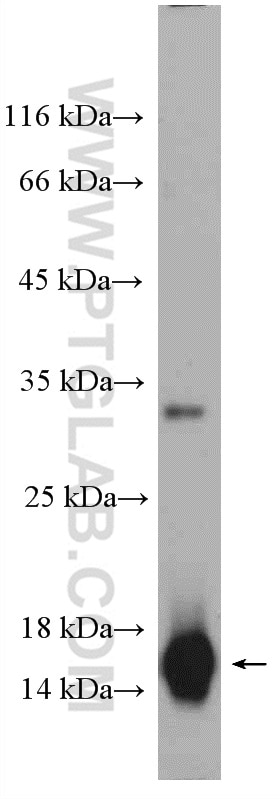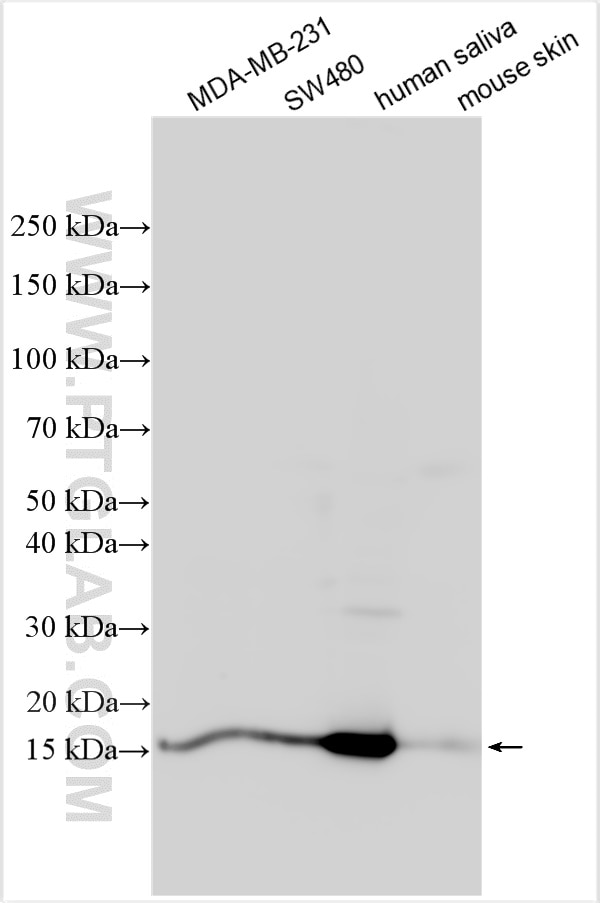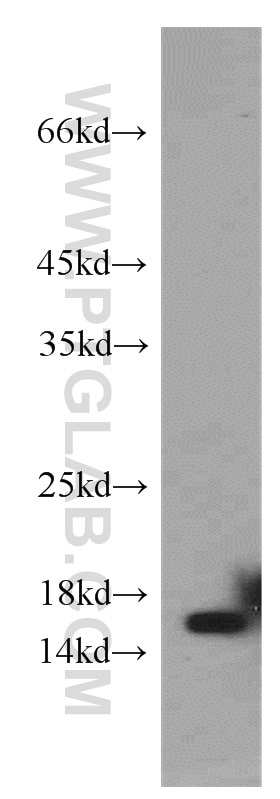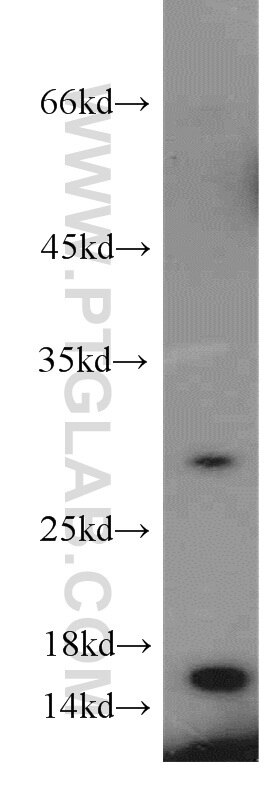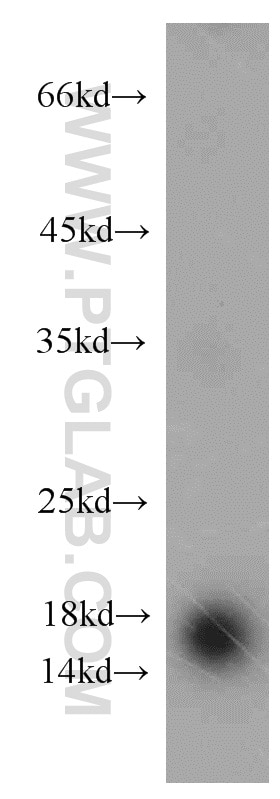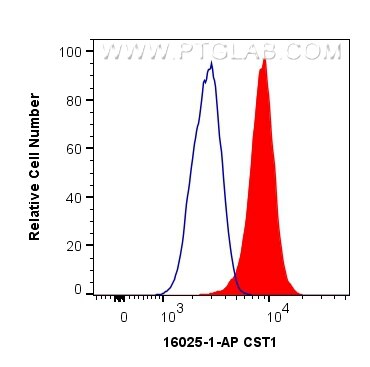- Featured Product
- KD/KO Validated
Cystatin SN/CST1 Polyklonaler Antikörper
Cystatin SN/CST1 Polyklonal Antikörper für WB, FC (Intra), ELISA
Wirt / Isotyp
Kaninchen / IgG
Getestete Reaktivität
human, Maus und mehr (1)
Anwendung
WB, IHC, IF, FC (Intra), IP, CoIP, ChIP, ELISA
Konjugation
Unkonjugiert
Kat-Nr. : 16025-1-AP
Synonyme
Geprüfte Anwendungen
| Erfolgreiche Detektion in WB | MDA-MB-231-Zellen, COLO 320-Zellen, humanes Nebennierengewebe, humanes Hodengewebe, Maushautgewebe, SW480-Zellen |
| Erfolgreiche Detektion in FC (Intra) | MCF-7-Zellen |
Empfohlene Verdünnung
| Anwendung | Verdünnung |
|---|---|
| Western Blot (WB) | WB : 1:1000-1:8000 |
| Durchflusszytometrie (FC) (INTRA) | FC (INTRA) : 0.40 ug per 10^6 cells in a 100 µl suspension |
| It is recommended that this reagent should be titrated in each testing system to obtain optimal results. | |
| Sample-dependent, check data in validation data gallery | |
Veröffentlichte Anwendungen
Produktinformation
16025-1-AP bindet in WB, IHC, IF, FC (Intra), IP, CoIP, ChIP, ELISA Cystatin SN/CST1 und zeigt Reaktivität mit human, Maus
| Getestete Reaktivität | human, Maus |
| In Publikationen genannte Reaktivität | human, Ratte |
| Wirt / Isotyp | Kaninchen / IgG |
| Klonalität | Polyklonal |
| Typ | Antikörper |
| Immunogen | Cystatin SN/CST1 fusion protein Ag8862 |
| Vollständiger Name | cystatin SN |
| Berechnetes Molekulargewicht | 141 aa, 16 kDa |
| Beobachtetes Molekulargewicht | 14-16 kDa |
| GenBank-Zugangsnummer | BC021225 |
| Gene symbol | CST1 |
| Gene ID (NCBI) | 1469 |
| Konjugation | Unkonjugiert |
| Form | Liquid |
| Reinigungsmethode | Antigen-Affinitätsreinigung |
| Lagerungspuffer | PBS with 0.02% sodium azide and 50% glycerol |
| Lagerungsbedingungen | Bei -20°C lagern. Nach dem Versand ein Jahr lang stabil Aliquotieren ist bei -20oC Lagerung nicht notwendig. 20ul Größen enthalten 0,1% BSA. |
Hintergrundinformationen
CST1, or cystatin SN, is a gene in humans that encodes a secreted protein belonging to the type 2 cystatin superfamily, which includes CST1, CST2, CST3, CST4, and CST5. These proteins are cysteine proteinase inhibitors found in various human fluids and secretions, where they appear to provide protective functions. CST1 is specifically found in saliva, tears, urine, and seminal fluid, and it plays a role in inhibiting the activity of cysteine proteases. CST1 has been implicated in various pathological processes, including tumor invasion and metastasis. Overexpression of CST1 has been observed in several types of cancer, such as lung, breast, colorectal, and gastric cancer, suggesting its role in the proliferation, invasion, and metastasis of these tumors.
Protokolle
| PRODUKTSPEZIFISCHE PROTOKOLLE | |
|---|---|
| WB protocol for Cystatin SN/CST1 antibody 16025-1-AP | Protokoll herunterladen |
| FC protocol for Cystatin SN/CST1 antibody 16025-1-AP | Download protocol |
| STANDARD-PROTOKOLLE | |
|---|---|
| Klicken Sie hier, um unsere Standardprotokolle anzuzeigen |
Publikationen
| Species | Application | Title |
|---|---|---|
Cell Rep Med Personalized drug screening in patient-derived organoids of biliary tract cancer and its clinical application | ||
Nat Commun Integrated single-cell transcriptome analysis reveals heterogeneity of esophageal squamous cell carcinoma microenvironment. | ||
Cell Res Differential secretome analysis reveals CST6 as a suppressor of breast cancer bone metastasis. | ||
Oncogene CST1 inhibits ferroptosis and promotes gastric cancer metastasis by regulating GPX4 protein stability via OTUB1
| ||
Mol Oncol Cancer-associated fibroblasts educate normal fibroblasts to facilitate cancer cell spreading and T cell suppression. | ||
Aging (Albany NY) Transcriptional dysregulation of TRIM29 promotes colorectal cancer carcinogenesis via pyruvate kinase-mediated glucose metabolism. |
